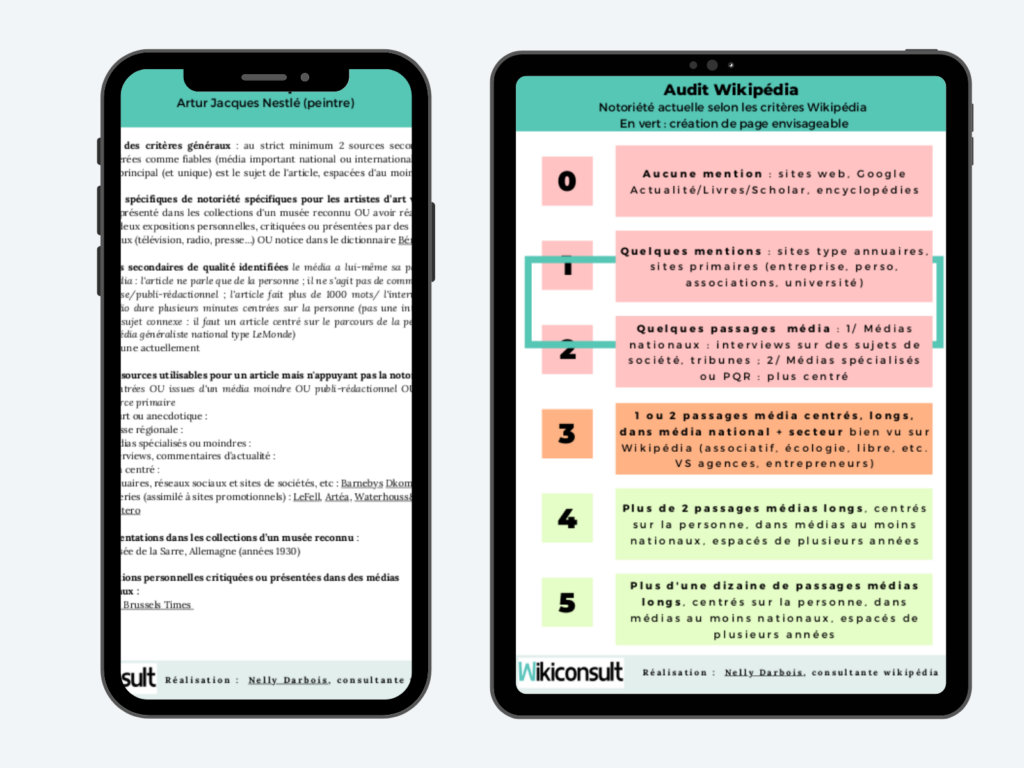Having a Wikipedia page is a goal sought by many entrepreneurs, leaders, writers, and other public figures. But how famous do you have to be to get a Wikipedia page?
In this article, we will explore Wikipedia’s notability criteria, the steps to determine if a person or entity qualifies for a page, and the available alternatives.
Plan
Notoriety on Wikipedia: what really counts
Contrary to what you might think, it’s not just about fame or popularity in the broadest sense. On Wikipedia, the important thing is eligibility, which is based on reliable, independent secondary sources.
🚨 These sources must provide relevant information about the person, and they cannot be publications from the person himself or his partners.
This means that national media or specialist publications must have been published on the person whose page you wish to create.
These sources must be the fruit of rigorous journalistic or editorial work.
For example, if you’re a writer, a short interview in a local newspaper won’t be enough, but an in-depth review of your work in a recognized magazine might be a good place to start.
Specific and general criteria for fame on Wikipedia
Wikipedia has dozens of specific notability criteria for each field of activity, in addition to general criteria. The complete list is here.
Here are a few examples for different profiles:
- Writers: You must have published at least 2 self-published works that have been discussed in national academic or mainstream media, with in-depth analyses.
- Painters, sculptors, photographers and other artists: be represented in the collections of a recognized museum or have had at least two solo exhibitions, critically acclaimed or presented by national media.
- Academics and researchers: having received a nationally or internationally recognized scientific award (such as the Nobel Prize, Gold Medal, etc.), or being regarded as a leading author in the relevant field, or being credited as the originator of a widely disseminated theory.
- Entrepreneurs and managers: no specific criteria.
- Start-ups, SMEs or larger companies : the company or business is included in a notable, limited and independent company ranking, or the company’s share price is used to calculate a notable stock market index.
- Athletes: have received at least one Olympic diploma (first eight places per event) at the Olympic Games, among other criteria.
- Politicians: to qualify for a Wikipedia page, politicians must meet specific notability criteria, such as holding a significant government or legislative position, being mayor of a major city, or having extensive media coverage in well-known outlets.
You don’t meet these specific notability criteria, or there is no category matching your profile (for example, for lawyers)?
Look to see if you tick the general notability criteria: two media outlets of national and general scope (articles, books, TV or radio programs, etc.) have published investigative content focused on the entity at least two years apart. This guarantees a lasting reputation, rather than just a temporary spotlight.
👀Check your eligibility on Wikipedia with a notability audit
Request a comprehensive audit from us to determine your eligibility on the encyclopedia (delivered within 48 hours) or learn about alternative options that may be more relevant for your situation.
How can you determine whether you are eligible for a Wikipedia page?
Before embarking on the creation of a page, it’s crucial to assess whether the person or entity meets Wikipedia’s eligibility criteria.
Here’s how it works:
- Identify secondary sources: use tools like Google News, Google Scholar, Google Books, Researchgate/ORCID or even audiovisual archives like INA to search for articles, interviews or reviews focusing on the person.
- Check media coverage: sources should be sufficiently detailed, and not simply mention the person in passing. They must demonstrate research or analysis, be sufficiently long and focus solely on the entity in question.
- Evaluate the temporality of sources: make sure that sources are at least two years apart, or that there are a number of them. This proves that notoriety is not ephemeral.

What if you don’t meet the criteria?
It’s possible that you don’t yet meet the strict criteria for Wikipedia eligibility. In this case, all is not lost.
There are actions you can take to strategically increase your media coverage. Here are a few ideas, adapted to your sector of activity:
- Press relations: if you don’t have the resources in-house, work with a press relations agency (or freelancer) to generate articles in relevant and respected media. At Wikiconsult, we can put you in touch with competent professionals in these fields. Please contact us.
- Collaborations and partnerships: increase your visibility by associating yourself with major events or projects that could attract media attention.
- Contributions to your industry: publish books, academic articles (in peer-reviewed journals), or take part in public events that will be documented by the media.
- Give it time: you can also decide not to be pro-active specifically on this subject. As the ROI of press relations is difficult to quantify, this is an attitude worth considering.
If you’d also like to create a Wikipedia page to help your website rank higher in Google and other search engines (SE0), you might also consider creating a page on one of Wikipedia’s alternatives.

Written by Albin Guillaud
A Wikipedia contributor since 2014, with Wikiconsult I support businesses, institutions, public figures, and agencies looking to create, update, or monitor their presence on Wikipedia.